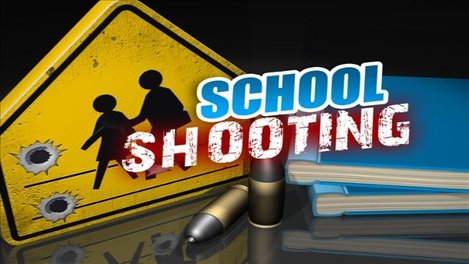At the time of this writing, there have been 52 US school shootings in 2015. 30 people have been killed, 53 others have been injured. The most recent and bloodiest of the year was at Umpqua Community College in Roseburg, Oregon, where 9 were injured and 10 lost their lives, including the gunman.
Although a single motive is not definitively clear, the gunman kept a blog wherein he described in a series of rambles his thoughts on a range of topics. One of his writings included a discussion of the TV reporter who shot and killed two of his colleagues, a cameraman and reporter, during a live broadcast. “On an interesting note, I have noticed that so many people like him are all alone and unknown, yet when they spill a little blood, the whole world knows who they are,” he wrote on August 31, 2015.
“A man who was known by no one, is now known by everyone. His face splashed across every screen, his name across the lips of every person on the planet, all in the course of one day. Seels the more people you kill, the more you’re in the limelight.”
One month later, the writer became a murderer in the worst school shooting of 2015.
It is clear that the gunman’s motive, at least in part, was a desperate final attempt to be known. This alone is not a deplorable aspiration – as people each of us possess an innate desire to leave a legacy on this planet, some way that future generations will know we once existed. Our collective obsession with celebrity is an example of our glorification of being known.
This paired with our focus on the macabre, our fascination with the unusual, facilitates a space where depressed, lonely, or otherwise disregarded youth can pave a way to being known. They see how we seemingly celebrate killers. We put their names in history books. This particular gunman was absolutely right in stating, “the more people you kill, the more you’re in the limelight.”
This is our problem. Gun control is an entirely different conversation, the conversation here is ceasing this insane glorification of murderers who are killing our teachers, our students. Our citizens who are teaching, learning, and pursuing education.
In a positive step toward a solution, Oregon Sheriff John Hanlin has vowed to not speak the name of the gunman. After the tragedy Hanlin stated, “I don’t want to glorify the shooter, I don’t want to glorify his name, I don’t want to glorify his cause.” In interview after interview, Hanlin has reiterated that he “will never” say the shooter’s name.
End Killing for Fame
The Oregon gunman is certainly not the first in his quest for fame – or infamy. The pair of teens responsible for the massacre at Columbine High School predicted on videotapes that their actions would be one for the history books. Sadly they were right after they claimed the lives of 12 fellow students and 1 teacher.
The murderer responsible for the killings near UC Santa Barbara in nearby Isla Vista expressed similar sentiment. Before fatally shooting 3 individuals and stabbing 3 others to death, he wrote in an autobiography that, “Infamy is better than total obscurity.”
It’s up to us when recalling these horrific events to remember the names of the victims and the heroes in these assaults — not the killers. On the day Umpqua Community College was attacked, 30-year-old Chris Mintz was in one of the classrooms where the killer opened fire. In response, Mintz charged directly at the gunman, saving the lives of countless peers. He was shot at least 5 times that day — the same day of his son’s 6th birthday.
If there is any name you remember from this most recent tragic event, let it be Chris Mintz.
Source:






